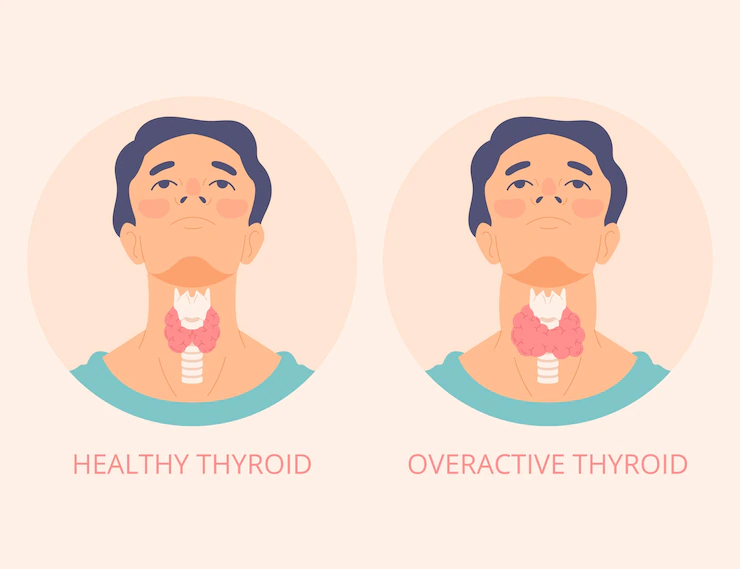What are the Types, Signs & Symptoms of Thyroid Cancer?

It’s not uncommon for people with thyroid cancer to experience few or no symptoms and these signs and symptoms will all vary from person to person. For example, some people may just have one of these, while some might have all three – which is a good reason why it’s vital to know your body so you can spot the signs.
Thyroid cancer is the growth of cells that starts in the thyroid gland, which produces hormones that regulate heart rate, blood pressure, and body temperature. The thyroid is a small butterfly-shaped gland located at the bottom of the neck, just below Adam’s apple.
Thyroid cancer might not have any symptoms in the beginning stages. However, as it progresses, there is a chance that some will be noticed – for example swelling of the neck, voice change, or difficulty swallowing.
There are several types of thyroid cancer. Most grow slowly, yet some can be quite aggressive. Most thyroid cancers can be treated with medication if diagnosed early enough.
Increased thyroid cancer rates seem to coincide with the spread of improved imaging technology that can detect small thyroid cancers. These incidental thyroid cancers account for a majority of detections nowadays, as opposed to being diagnosed only after developing symptoms.
Table of contents
Causes of Thyroid Cancer
Thyroid cancer happens when cells within the thyroid develop changes to their DNA A cell’s DNA contains the instructions it needs to do different things and stay healthy.
Doctors call these changes “mutations”. These mutations tell the cells to grow and multiply at a rapid pace. This happens because healthy cells naturally die when exposed to this amount of pressure. The accumulating cells form a tumor that is larger than usual.

The tumor can grow and spread local cancer cells to surrounding tissue. In some cases, the cancer cells can spread to lymph nodes in the neck and even beyond the neck to other parts of your body, such as your lungs, bones, or other organs.
Symptoms & Signs of Thyroid Cancer
Thyroid cancer is generally diagnosed without symptoms, but it may show as:
- A nodule is a small tumor-like growth that can be felt through the skin on the neck.
- A feeling that tight collar shirts are becoming too tight!
- Swollen lymph nodes in the neck
- Your voice might be changing and becoming more hoarse or dry.
- Difficulty swallowing
- Pain in your neck and throat
Types of thyroid cancer and Signs & Symptoms of Each
Thyroid cancer is classified that depend on the types of cells found in the tumor.
There are four types of thyroid cancer:
1. Differentiated thyroid cancers
Thyroid cancer is a general term for a disease that starts in cells and tissues of the thyroid. These cells are called follicular cells.
- Papillary thyroid cancer. This type of thyroid cancer is the most common and often doesn’t have any symptoms. That said, they usually grow slowly and show no sign of spreading to other parts of the body. A small percentage of papillary thyroid cancers are aggressive and may grow to affect structures in the neck or spread. Sometimes these tumors can even travel to other parts of your body.
- Hurthle cell thyroid cancer. This type of thyroid cancer was once thought to be something entirely different. Now it is considered a new subtype of thyroid cancer because the cells inside the tumor behave differently and respond to different medications. Hurthle cell thyroid cancers are serious and can spread to other parts of the body.
- Follicular thyroid cancer. This rare type of thyroid cancer usually affects those over the age of 50. Follicular thyroid cancer cells rarely spread to the lymph nodes in the neck. In some severe cases, they can spread to other parts of the body.
- Poorly differentiated thyroid cancer. This type of thyroid cancer is one of the rarest but usually doesn’t respond to the usual treatments.
2. Medullary thyroid cancer
C cells located in the thyroid gland produce a hormone called calcitonin. One of the rare forms of thyroid cancer is characterized by its origin from these cells. In addition, elevated levels of calcitonin in your blood can indicate medullary thyroid cancer very early on. For example, the cause of some medullary thyroid cancers are a gene RET, which is from parents to children.
3. Anaplastic thyroid cancer
Thyroid cancer comes in rare types that grow quickly and are difficult to treat. However, treatments can help slow the progression of the disease. Anaplastic thyroid cancer is often diagnosed in people over 60. It can be easy to spot and cause serious symptoms, such as neck swelling that worsens very quickly and breathing difficulties. Swallowing too can become difficult.
4. Other rare types
Other types of cancer can also start in the thyroid, such as thyroid lymphoma or sarcoma. These arise in the immune cells or connective tissue cells respectively and are very rare.
Signs of Thyroid cancer: Risk factors
If a person has any of the following risk factors, they are at an increased risk for developing thyroid cancer:

- Seen more in Female Than males. Thyroid cancer occurs significantly more often in women. Experts think it may be due to the hormone estrogen.
- Exposure to high levels of radiation may lead to thyroid cancer. Exposure to high levels of radiation when undergoing head and neck radiation treatments increases the risk of thyroid cancer.
- Certain inherited genetic syndromes can increase your risk of getting thyroid cancer. Also, these syndromes include familial medullary thyroid cancer, multiple endocrine neoplasia, Cowden syndrome, and familial adenomatous polyposis. Some kinds of thyroid cancer are more likely to occur if you have a family history. These include medullary, papillary, and follicular cancers.
Complications
Thyroid cancer can come back
Thyroid cancer can come back even after successful treatment, or even if you’ve had your thyroid taken out. This is because cancer cells might spread to other parts of the body before their removal occurs.
Most thyroid cancer doesn’t come back, including the most common types of thyroid cancer — papillary thyroid cancer and follicular thyroid cancer. Therefore, your doctor can tell you if your type of thyroid cancer is likely to come back with various tests.
When thyroid cancer recurrence occurs, we can find it within five years of your initial diagnosis.
Thyroid cancer can often be treated. Most of the time, treatment is successful and your prognosis is positive.
Thyroid cancer may recur in:
- Lymph nodes in the neck
- Small pieces of thyroid tissue can sometimes be left behind during surgery.
- Other parts of the body, such as your lungs and bones
Your doctor may recommend periodic tests to see if your cancer has returned in the form of thyroid tumors. The doctor may ask you during these appointments whether you are experiencing any signs or symptoms of thyroid cancer recurrence, such as
- Neck pain
- A lump in the neck
- Trouble swallowing
- Voice changes, such as hoarseness
Metastasizes: Thyroid cancer that spreads
Thyroid cancer from time to time spreads to the nearby lymph nodes or other parts of the body. The cancer cells might be visible after diagnosis or during treatment. The majority of thyroid cancers don’t ever spread at all.
When thyroid cancer spreads, it often goes to:
- Lymph nodes in the neck
- Lungs
- Bones
- Brain
- Liver
- Skin
Thyroid cancer that spreads might be visible on imaging tests when you are first diagnosed with thyroid cancer.
After successful treatment for thyroid cancer, your healthcare provider might recommend follow-up appointments to look out for signs that cancer has come back.
Prevention
Scientists are still unclear about the causes of these gene changes. Without understanding this, our species can’t prevent thyroid cancer in people who have a potential risk.
People with a high risk
Adults or children who have the gene that makes their chance of medullary thyroid cancer higher may want to talk with a genetic counselor before proceeding with a thyroid operation. Thyroid surgery is an option to reduce your risk, but you should discuss your options and the potential risks first.
People near nuclear power plants
If you live near a nuclear power plant, there is a treatment that might be available to you in the event of an accident-potassium iodide. If you live within 10 miles of a nuclear power plant and are concerned about safety precautions, contact your state or local emergency management department or else your regional or national network for more information
Takeaway
If you diagnose cancer, it may be possible to address your symptoms. Managing symptoms is often called palliative care or supportive care. Your doctor might recommend treatment soon after diagnosis. They may also ask you to keep track of your symptoms, like new or changing symptoms. Make sure to talk with your healthcare team about these things.
Products That We Suggest for you
Thyromine- Thyroid Health Supplement
Our potent, high-quality supplement can: Support a healthy digestive tract. Also it supports healthy nutrient absorption. Support a healthy immune system
To know more and purchase, Click Here
Nutritional support for healthy thyroid function-Thyroid Support
VitaPost Thyroid Support is a bespoke blend of ingredients specifically to help support healthy thyroid hormone production.
To know more and purchase, Click Here








Comment to this Article
Comments that encourage respectful conversation are welcomed at AGP Health n Beauty. Stay on subject, please. Comments that are aggressively promotional of goods or services or that include personal attacks, vulgar language, or other forms of abuse will be deleted. Which remarks break our comment policy will be decided at our discretion. (Anonymous comments are accepted; just leave out your name in the comment box. Although necessary, your email address won't be posted with your comment.)